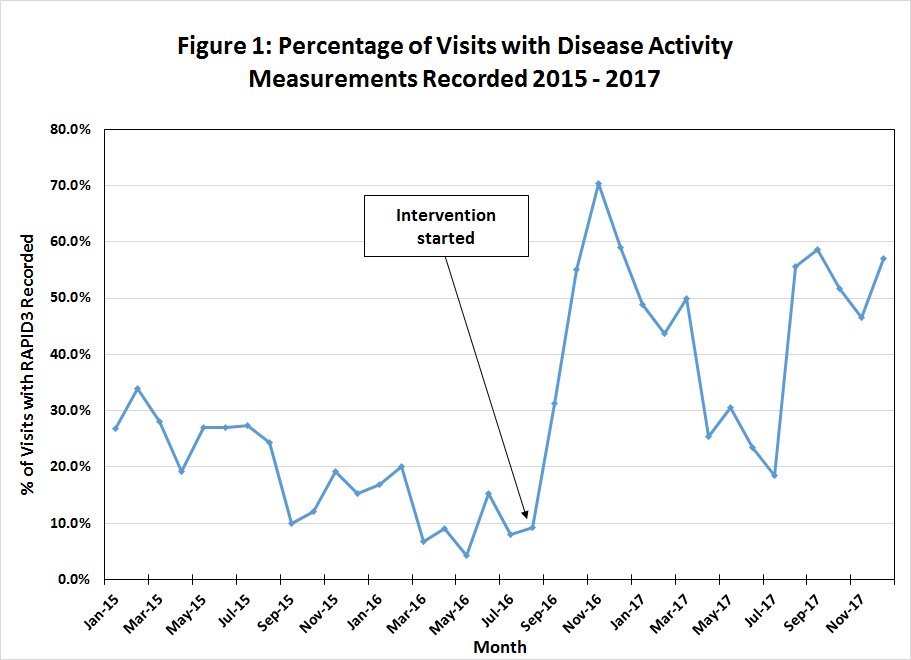Session Information
Session Type: ACR Poster Session A
Session Time: 9:00AM-11:00AM
Background/Purpose:
“Treat to target” is the goal of therapy in the treatment of Rheumatoid Arthritis (RA) based on the 2015 American College of Rheumatology (ACR) guidelines. Disease specific patient-reported outcome measures are a critical component of patient care to assess disease activity and function. The ACR recommends that disease activity measurement be performed in the majority of encounters for RA patients. This can be difficult to achieve in a busy Rheumatology practice. We hypothesized that using a collaborative and team-based approach would help us collect these data more effectively.
Methods:
Beginning in September 2016, we trained the medical assistants in the Rheumatology clinic at the MetroHealth Medical Center on the administration and collection of RAPID3 questionnaires for all patients with RA seen for an office visit. To evaluate the effectiveness of this educational intervention, we retrospectively abstracted data from the medical record (Epic) for all patients with a problem list diagnosis of Rheumatoid Arthritis and who were seen for an office visit in the Rheumatology clinic between January 1, 2015 and December 31, 2017. We calculated the percentage of visits in which a RAPID3 was collected. We then compared pre-intervention to post-intervention results, using Chi-square analysis to determine statistical significance.
Results:
Between January 1, 2015 and December 31, 2017, there were a total of 4485 visits for persons with a diagnosis of RA (1552 visits in 2015, 1590 in 2016 and 1333 in 2017). Prior to the intervention, 17.8% of patient visits (474/2663) included a RAPID3. After initiation of the intervention, the percentage of visits with a RAPID3 increased rapidly (Figure 1) and overall post-intervention, 45.7% of visits (832/1822) for RA patients had a RAPID3 recorded (p-value < 0.001 for pre- to post-intervention comparison).
Conclusion:
The use of inter-professional collaboration is an effective way to improve adherence to ACR recommendations and provide high-quality care for patients with RA. A similar strategy to what we employed in our clinic could easily be implemented in other busy Rheumatology practices.
To cite this abstract in AMA style:
Weinberger E, Einstadter D, Magrey M. Use of Inter-Professional Collaboration to Improve Adherence to American College of Rheumatology Recommendations for Use of Disease Activity Measures [abstract]. Arthritis Rheumatol. 2018; 70 (suppl 9). https://acrabstracts.org/abstract/use-of-inter-professional-collaboration-to-improve-adherence-to-american-college-of-rheumatology-recommendations-for-use-of-disease-activity-measures/. Accessed .« Back to 2018 ACR/ARHP Annual Meeting
ACR Meeting Abstracts - https://acrabstracts.org/abstract/use-of-inter-professional-collaboration-to-improve-adherence-to-american-college-of-rheumatology-recommendations-for-use-of-disease-activity-measures/

